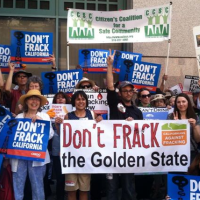Frackers Await the Flow of Water from the $26-Billion Delta Project
 Californians Against Fracking
Californians Against Fracking
Skeptics who question the state spending at least $26 billion on a makeover for Sacramento-San Joaquin Delta that they think tilts heavily toward agribusiness and industrial interests can add one more factor to that side of the equation—fracking.
The folks who drew up the Bay Delta Conservation Plan (BDCP) have a webpage that publishes answers on a weekly basis to questions about the looming mega-project that would redirect water from the Sacramento and San Joaquin Rivers through two tunnels to farmers, businesses and thirsty Californians to the south and west.
Draft documents for the plan were released last month by the state Department of Water Resources (DWR), kicking off a year-long public review process. Conservationists and friends of the Delta would like to see the project centered around restoring the habitat, nurturing threatened species, shoring up levees and otherwise securing the area.
Water interests want more water and—in case it wasn’t clear before, the BDCP makes it clear now—that includes oil and gas drillers using hydraulic fracturing. In answer to the question “Will water pumped from the Delta be used for fracking in the Central Valley?” the answer was yes. “Fracking presumably would be an ‘industrial’ use of water.”
But the response cautions not to worry about a drilling process that blasts apart rock by injecting enormous amounts of pressurized water, sand and toxic chemicals deep into the ground. “Voluntary reporting indicates that the use of water for fracking is minimal,” according to the BDCP.
That reporting would have to be voluntary because the state does not require drillers to reveal where they drill, when they drill or what they put in the ground and its aquifers. New York State has a law that bans fracking until 2015, but California’s recent first stab at regulating the practice does not require full disclosure by energy companies.
Jesse Jenkins at The Energy Collective looked at the voluntary industry reporting at FracFocus.org and calculated that each fracking well uses 5 million gallons of water for its fracturing and completion. That agrees with a report on fracking (pdf) of Marcellus Shale in West Virginia and Pennsylvania.
But the report casts doubt on its own findings and warns about the future:
“It is highly likely that much more water is being withdrawn and more waste is being generated than is known. . . . While West Virginia and Pennsylvania are generally water-rich states, these findings indicate that horizontal drilling and hydraulic fracturing operations could have significant impacts on water resources in more arid areas of the country.”
The Associated Press says drilling interests have all but given up on fracking in New York. The opposite is true in California, where state politicians and energy industry executives are salivating over the Monterey Shale, a vast Central California field of oil that some think could yield 15.3 billion barrels. They need fracking to access what may be 60% of the country’s known shale oil.
Most of the water used in fracking for shale is gone for good. About 80% of the fracking water remains stuck in the shale deposit, while about 20% flows back up the well as contaminated wastewater, which, drillers being drillers, is usually stuffed back into deep injection wells. Fracking has been linked to groundwater contamination, air pollution, releases of methane gas, micro-earthquakes and sinkholes.
If the Monterey Shale turns out to be a booming enterprise in future years, it could be the newest contestant in the Delta water wars unless the Legislature intervenes, according to the BDCP site.
“If the Legislature declared fracking to be unreasonable, it would potentially trigger the State Water Resources Control Board to revise water right permits in such a way as to restrict Delta water from being used for fracking.”
That doesn’t look like it will be happening in the near future.
–Ken Broder
To Learn More:
Fracking: The Bay Delta Conservation Plan Would Provide Water for Mining (by Paul Rockwell, San Jose Mercury News op-ed)
Your Questions Answered (Bay Delta Conservation Plan)
Water Resource Reporting and Water Footprint from Marcellus Shale Development in West Virginia and Pennsylvania (by Evan Hansen, Dustin Mulvaney and Meghan Betcher, Earthworks Oil & Gas Accountability Project)
Pro-Gas Interests Decry NY Inaction on Fracking (by Mary Esch, Associated Press)
Lawmakers OK Fracking Legislation with Giant Loopholes (by Ken Broder, AllGov California)
- Top Stories
- Controversies
- Where is the Money Going?
- California and the Nation
- Appointments and Resignations
- Unusual News
- Latest News
- California Forbids U.S. Immigration Agents from Pretending to be Police
- California Lawmakers Urged to Strip “Self-Dealing” Tax Board of Its Duties
- Big Oil’s Grip on California
- Santa Cruz Police See Homeland Security Betrayal in Use of Gang Roundup as Cover for Immigration Raid
- Oil Companies Face Deadline to Stop Polluting California Groundwater





